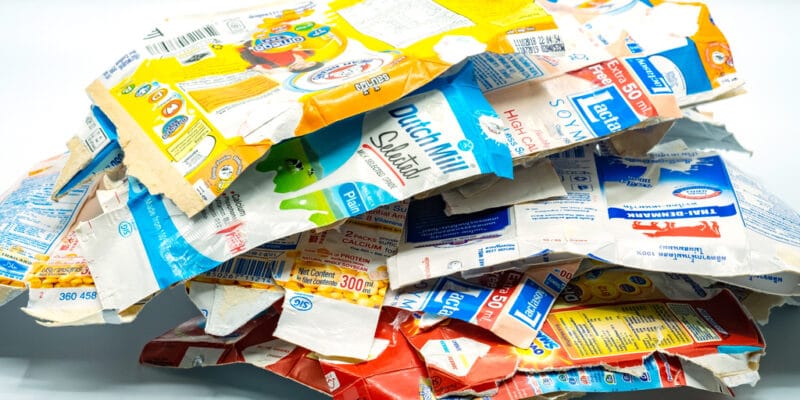In South Africa, 68.4% of paper produced is recycled after use. Of this percentage, a tiny fraction is food and beverage carton waste, according to Fibre Circle. The organisation recently launched a campaign to raise awareness about the mass collection of these cartons, which can be turned into paper packaging or building materials.
The initiative launched by Fibre Circle in South Africa is part of the ‘Super Cartons’ project, which it is implementing in partnership with Nampak Liquid Cartons, SIG Combibloc and Tetra Pak South Africa. Through its awareness campaign, Fibre Circle wants to showcase the value of waste food and beverage cartons to producers and consumers in the country.
The production of paper packaging and building materials
According to Fibre Circle, food (cereals, sugar, rice, etc.) and beverage (milk, juice, wine, etc.) cartons can have “up to five layers formed on a multi-layer machine and are mainly composed of sustainably sourced chemical pulp, bleached or unbleached, also known as paperboard. The other layers are made of polyethylene for long shelf life products, with an aluminium layer added”.
According to the same source, waste paperboard goes through a pulping process, in which the product is pulped and separated from the other layers. The pulp is then used to make new paper-based products (packaging) and the extruded or moulded plastic components to form other products such as boards, pallets, furniture, desks and tiles for construction.
Reducing the environmental impact of business
As part of the ‘Superboards’ campaign, stakeholders are going into shops, using an ‘eye-catcher’ and displaying board products to encourage consumers to enter an online competition. “The campaign will be amplified by a digital marketing component via the Paper Manufacturers Association of South Africa (PAMSA) Facebook page, our close ally,” says Fibre Circle.
By May 5th, 2021, “Extended Producer Responsibility (EPR) will become mandatory in South Africa,” says François Marais, Fibre Circle’s director. This will oblige South African companies to reduce the environmental impact of their products and packaging, not only during the production process, but also once they are in the hands of consumers, and beyond.
Ines Magoum






